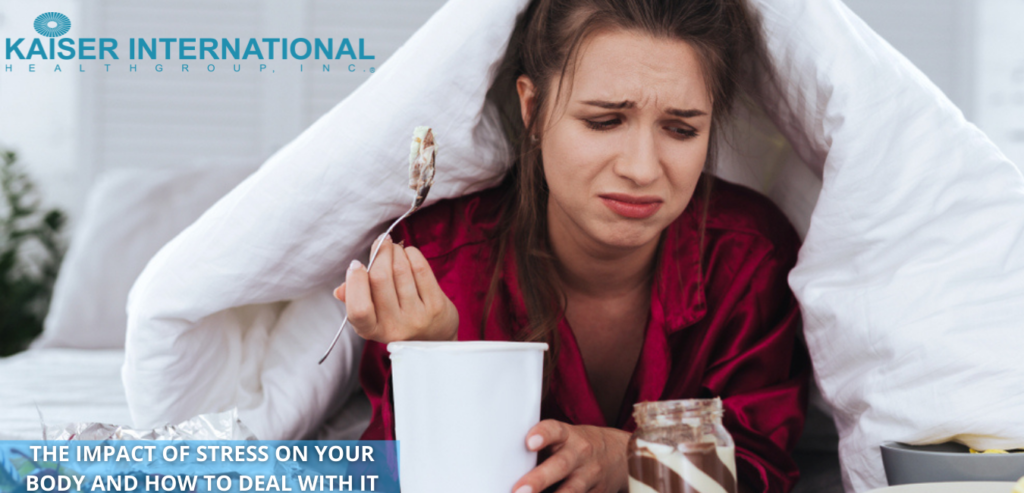Stress symptoms may be affecting your health, even though you might not realize it. You may think illness is to blame for that irritating headache, your frequent insomnia, or your decreased productivity at work. But stress may actually be the cause.
Stress is any change in the environment that requires your body to react and adjust in response. The body reacts to these changes with physical, mental, and emotional responses. Stress is a normal part of life. Many events that happen to you and around you and many things that you do yourself, put stress on your body. You can experience good or bad forms of stress from your environment, your body, and your thoughts. Here are some of the impacts of stress on your body and how to deal with it.
Central nervous and endocrine systems
Your central nervous system (CNS) is in charge of your “fight or flight” response. In your brain, the hypothalamus gets the ball rolling, telling your adrenal glands to release the stress hormones adrenaline and cortisol. These hormones rev up your heartbeat and send blood rushing to the areas that need it most in an emergency, such as your muscles, heart, and other important organs.
When the perceived fear is gone, the hypothalamus should tell all systems to go back to normal. If the CNS fails to return to normal, or if the stressor doesn’t go away, the response will continue. Chronic stress is also a factor in behaviors such as overeating or not eating enough, alcohol or drug abuse, and social withdrawal.
Respiratory and cardiovascular systems
Stress hormones affect your respiratory and cardiovascular systems. During the stress response, you breathe faster in an effort to quickly distribute oxygen-rich blood to your body. If you already have a breathing problem like asthma or emphysema, stress can make it even harder to breathe.
Under stress, your heart also pumps faster. Stress hormones cause your blood vessels to constrict and divert more oxygen to your muscles so you’ll have more strength to take action. But this also raises your blood pressure.
As a result, frequent or chronic stress will make your heart work too hard for too long. When your blood pressure rises, so do your risks of having a stroke or heart attack.
Digestive system
Under stress, your liver produces extra blood sugar (glucose) to give you a boost of energy. If you’re under chronic stress, your body may not be able to keep up with this extra glucose surge. Chronic stress may increase your risk of developing type 2 diabetes.
The rush of hormones, rapid breathing, and increased heart rate can also upset your digestive system. You’re more likely to have heartburn or acid reflux thanks to an increase in stomach acid. Stress can also affect the way food moves through your body, leading to diarrhea or constipation. You might also experience nausea, vomiting, or a stomachache.
Muscular system
Your muscles tense up to protect themselves from injury when you’re stressed. They tend to release again once you relax, but if you’re constantly under stress, your muscles may not get the chance to relax. Tight muscles cause headaches, back and shoulder pain, and body aches. Over time, this can set off an unhealthy cycle as you stop exercising and turn to pain medication for relief.
Sexuality and reproductive system
Stress is exhausting for both the body and mind. It’s not unusual to lose your desire when you’re under constant stress. While short-term stress may cause men to produce more of the male hormone testosterone, this effect doesn’t last.
If stress continues for a long time, a man’s testosterone levels can begin to drop. This can interfere with sperm production and cause erectile dysfunction or impotence. Chronic stress may also increase the risk of infection for male reproductive organs like the prostate and testes.
For women, stress can affect the menstrual cycle. It can lead to irregular, heavier, or more painful periods. Chronic stress can also magnify the physical symptoms of menopause.
What are the causes of inhibited sexual desire?
Immune system
Stress stimulates the immune system, which can be a plus for immediate situations. This stimulation can help you avoid infections and heal wounds. But over time, stress hormones will weaken your immune system and reduce your body’s response to foreign invaders. People under chronic stress are more susceptible to viral illnesses like the flu and the common cold, as well as other infections. Stress can also increase the time it takes you to recover from an illness or injury.
When to seek help
If you’re not sure if stress is the cause or if you’ve taken steps to control your stress but your symptoms continue, see your doctor. Your healthcare provider may want to check for other potential causes. Or consider seeing a professional counselor or therapist, who can help you identify sources of your stress and learn new coping tools.
Also, get emergency help immediately if you have chest pain, especially if you also have shortness of breath, jaw or back pain, pain radiating into your shoulder and arm, sweating, dizziness, or nausea. These may be warning signs of a heart attack and not simply stress symptoms.
